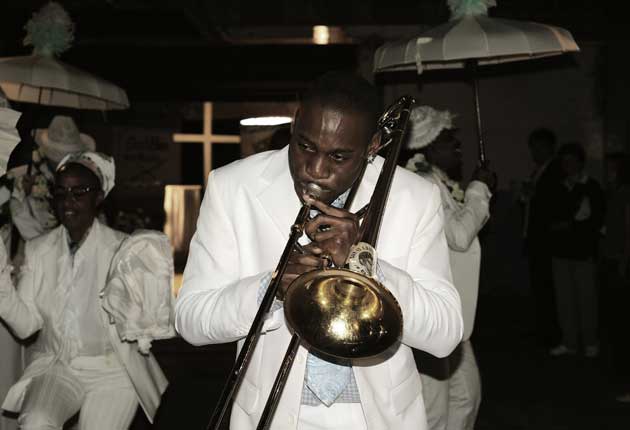Katrina, The Bargehouse, London
Not quite a perfect storm

Your support helps us to tell the story
From reproductive rights to climate change to Big Tech, The Independent is on the ground when the story is developing. Whether it's investigating the financials of Elon Musk's pro-Trump PAC or producing our latest documentary, 'The A Word', which shines a light on the American women fighting for reproductive rights, we know how important it is to parse out the facts from the messaging.
At such a critical moment in US history, we need reporters on the ground. Your donation allows us to keep sending journalists to speak to both sides of the story.
The Independent is trusted by Americans across the entire political spectrum. And unlike many other quality news outlets, we choose not to lock Americans out of our reporting and analysis with paywalls. We believe quality journalism should be available to everyone, paid for by those who can afford it.
Your support makes all the difference.Taking its audience through several rooms of a scabby warehouse, Katrina shows us what happened when that hurricane scythed through New Orleans four years ago and touched off an impromptu experiment in social Darwinism.
Fifteen hundred people died, not from the fury of nature but from neglect, incompetence, and, shockingly, malice. Inevitably, Katrina – constructed of verbatim accounts by Jonathan Holmes, who also directs – is painful, pungent, and bleakly comic. But its power is vitiated by a manner of presentation more political than theatrical.
Katrina begins with a stroll through a tourist office into a bar where a black woman shakes and sings as a television broadcasts hurricane warnings. The lights go out, and in a larger room the audience is seated, among |detritus and huge, leering carnival masks. Four black residents (two
women, two men) and two white tourists tell of being given no food, water, or transport, of policemen who lie and loot and shoot to kill. They do not despair, and some are heroic. A “low-life”, always “thinkin’ about me and only me”, sees two drowning children and “didn’t care nothing about life or death or whatever. I just knew I had to go jump in.”
A woman in love with a no-good man (“Comin’ home late one night he took a detour through some woman’s bedroom”) wraps his corpse up tight and keeps it with her on a journey through chaos. The tourists join with others to set up a camp, but the police destroy it and steal their food.
Yet the tales never link up, and their emotional impact is muffled by a variety of tones, which Holmes the writer has failed to orchestrate into a fluid whole. The poetic metaphor of the floating corpse is not fully exploited, and the white woman’s chirpiness (“Our little camp began to blossom... Co-operation, community and creativity flowered”) is almost risible. A rousing funeral finale feels unconnected to what has gone before.
Holmes the director has actors step up to a member of the audience and emote into his face, so as to “shatter boundaries between several parallel incarnations of ‘us’ and ‘them’” in a way that is “both empathetic and egalitarian, and so profoundly ethical.” Like the let’s-pretend room settings (excuse me, “installations”) and the “sonic puppetry” (vague noises), this is a hurricane of hot air.
It was only when I got home that I found, in the script, the best line of the evening, lost in the cross-talk. The head of federal relief, cornered by an indignant newsman, defended himself with this unassailable retort: “No disaster is perfect.”
To 26 September (020 7922-2922; www.coinstreet.org)
Join our commenting forum
Join thought-provoking conversations, follow other Independent readers and see their replies
Comments